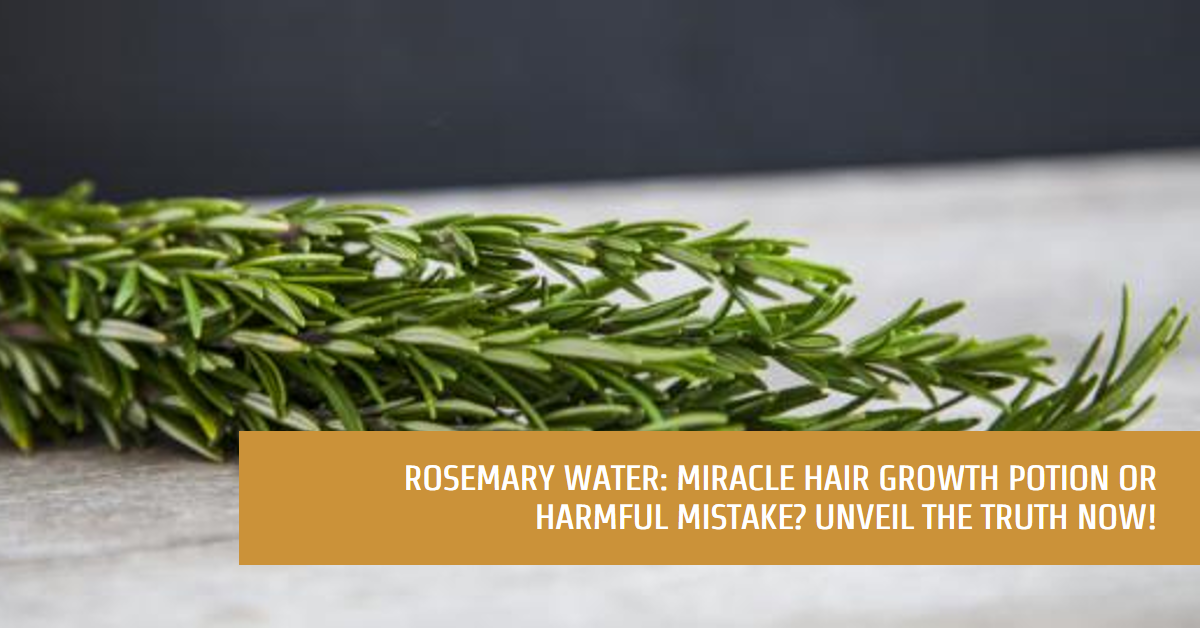Unlocking the secrets of nature for optimal hair care has been a pursuit spanning centuries. Among the myriad of botanical remedies, rosemary stands tall as a revered herb celebrated for its purported ability to foster hair growth and scalp health. In this article, we delve into the pros and cons of harnessing rosemary water for hair growth, shedding light on its effectiveness, potential side effects, and considerations for those seeking natural solutions for lush locks.
In This Article
Pros of Using Rosemary Water for Hair Growth:
1. Stimulates Hair Follicles:
Rosemary water is believed to possess properties that stimulate hair follicles, encouraging new growth. Its active compounds, such as rosmarinic acid and caffeic acid, have been studied for their potential to enhance microcirculation in the scalp, thereby promoting hair growth.
2. Strengthens Hair Shaft:
The rich antioxidant content in rosemary water can help strengthen the hair shaft, reducing breakage and split ends. Regular use of rosemary-infused treatments may result in stronger, more resilient hair strands that are less prone to damage.
3. Fights Dandruff and Scalp Irritation:
Rosemary water exhibits antimicrobial and anti-inflammatory properties, making it an effective remedy for dandruff and scalp irritation. Its soothing effects can help alleviate itching and flakiness, promoting a healthier scalp environment conducive to hair growth.
4. Improves Scalp Health:
By balancing sebum production and maintaining scalp pH, rosemary water helps create an optimal environment for hair follicles to thrive. A healthy scalp is essential for robust hair growth, and rosemary water contributes to scalp wellness through its cleansing and toning properties.
Cons of Using Rosemary Water for Hair Growth:
1. Potential Scalp Irritation:
While rosemary water is generally well-tolerated, some individuals may experience scalp irritation or allergic reactions upon its application. This can manifest as redness, itching, or burning sensations, particularly in those with sensitive skin or existing scalp conditions.
2. Dryness and Overuse:
Excessive use of rosemary water or failure to dilute it properly can lead to dryness of the scalp and hair. Its astringent nature may strip the scalp of natural oils, causing dryness and potentially exacerbating issues such as scalp flakiness and brittleness.
3. Allergic Reactions:
Although rare, allergic reactions to rosemary water can occur in susceptible individuals. Symptoms may include skin rash, hives, or swelling upon contact with the scalp. It is important to perform a patch test before using rosemary water extensively and to discontinue use if any adverse reactions occur.
4. Interactions with Medications:
Rosemary water may interact with certain medications or topical treatments for hair loss or scalp conditions. Individuals using prescription medications should consult with a healthcare professional before incorporating rosemary water into their hair care regimen to avoid any potential interactions or adverse effects.
Key Takeaway:
In the quest for luscious locks and a healthy scalp, rosemary water emerges as a promising natural remedy with a blend of benefits and considerations. While it offers the potential to stimulate hair growth, strengthen strands, and improve scalp health, it is essential to approach its usage with caution. By weighing the pros and cons outlined in this article and exercising diligence in its application, individuals can harness the power of rosemary water to support their hair growth journey while minimizing any associated risks.
Remember, achieving optimal hair health is a holistic endeavor that involves a balanced approach encompassing proper nutrition, hydration, and overall well-being. With rosemary water as a valuable ally in this pursuit, let nature’s bounty guide you towards vibrant, flourishing tresses.
Recommended Read: Harnessing the Power of Amla, Reetha, Shikakai for Lustrous Hair: Benefits and DIY Recipes











